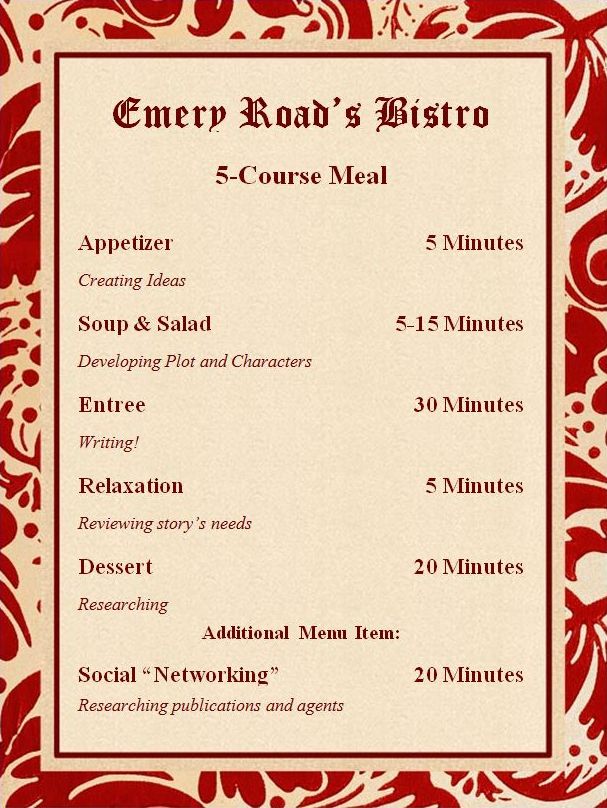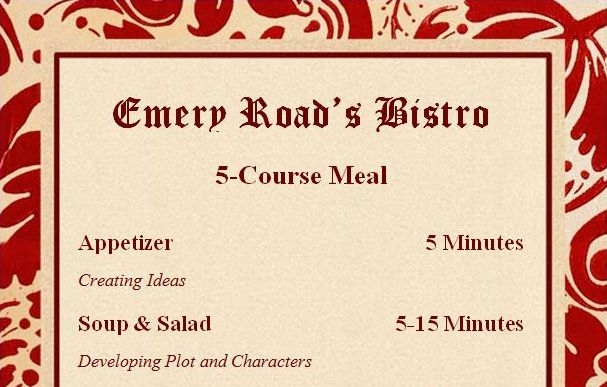
5-Course Meal Plan for Successful Writing Habits
When you’re short on time, you need to make the most of it so you can get as much writing done as possible. There are certain tricks you can use to make the most of your writing session. In a previous post, I talked about being prepared before your session. How you should spend about 10 minutes before your session reviewing what you are going to write.
This post offers a complete plan for working through your short stories or novels. The last thing you want to do when you finish your story is to stop writing. Often, when our stories are finished, we change focus to marketing our work. But writing your next story is just as important as finding a home for your current one.
Why? It’s easy to fall out of the habit of writing. If we give ourselves an excuse to do something else, we’ll have a hard time getting back into the process of writing. Once our work is complete, the meal plan below will turn into a 6-course meal plan.
Writing on a regular basis should be a habit for you. If it isn’t, there’s still time. Just work toward turning it into a habit. The more you get into the routine, the easier it will be to stick to it.
Here is your 5-course meal plan for successful writing habits:
Appetizer
Time Requirement: 5 minutes
I really love coming up with new ideas. It’s so fun to see what kinds of headlines you can get by clustering. It’s also fun to see what different roads your characters can take when you brainstorm.
The reason why it’s a good thing to have an arsenal of ideas is that ideas help open up your creative channels. They help you see different routes your characters could take, different personalities that could liven up your story. They get your “creative juices” flowing, allowing you to create stronger stories, stronger characters, and stronger plots.
Spend at least five minutes coming up with new ideas. When you’re in a slump with your current story, you can use those ideas as soundboards to getting back into the game.
Soup & Salad
Time Requirement: 5-15 minutes
Your next course is developing your plot and characters. When you first start planning your story, you won’t have all the answers. Some will come to you naturally; others you will have to pry out of dark passageways somewhere deep in your mind.
You’ll need to spend some time developing your plot and characters.
Idea-generating techniques aren’t just for story ideas or headlines for your next articles. You could use them to come up with your characters’ quirks and pet peeves. What kind of life-altering childhood experience did your character have? What is behind that perfect façade?
Characters aren’t perfect, and they’re certainly not cookie cutter replicas. They’re dynamic; they have minds of their own. They have backgrounds; they’ve had life-altering challenges and people in their lives who have impacted them positively and negatively. Their parents, siblings, relatives, close friends, enemies have all had an impact on their lives. All of those people help to create the character.
Does your character need encouragement to succeed? Is he living a lie?
Plan to spend 5-15 minutes, depending on how much time you have available, brainstorming for your story. This will help you to keep writing your story and prevent you from getting stuck because of some undetermined detail.
Entree
Time Requirement: 30 minutes
This is the most important course of the meal: writing. And I think you can take it from here. 🙂 Just remember to focus on the actual writing rather than the planning.
Relaxation
Time Requirement: 5 minutes
Once you’re finished with your main course (writing), give yourself a little break by writing down the things you need to research. Take stock of what you have so far, and figure out the details that you will need to move forward.
Dessert
Time Requirement: 20 minutes
Now that you’ve written down the details you need to research for your story, spend about 20 minutes finding the answers to your questions. Just like the other three development "courses", the research course will help you avoid getting stuck, allowing you to continue on your journey toward a completed manuscript.
The 6th Course of the Meal: Social "Networking"
Time Requirement: 20 minutes
If you are just getting started with your story, skip this course. But if you have a finished story (or are getting close to a finished story), your next course is to find a home for it.
If you haven’t done so already, now is the time to pick up a market guidebook that lists possible publications for your story. Writer’s Digest is a great resource. If you are a children’s writer, I highly recommend the guidebooks produced by the Institute of Children’s Literature.
Also, start searching for an agent. Review their guidelines and take note of those who would be a good fit for your story. In most cases, you will need a completed (and revised) manuscript before you actually submit your work to an agent.
Now that you have a plan for developing successful writing habits and completing your manuscripts, it's time to get to work!
As you move along the road to writing success, I'd love to hear from you. Please share your comments and questions over on my Facebook wall: https://facebook.com/jodycalkinsbiz
- It’s been a long time… - February 10, 2024
- Realizations About Tracking Progress - May 28, 2020
- Goal Setting & Productivity 101 - May 25, 2020
